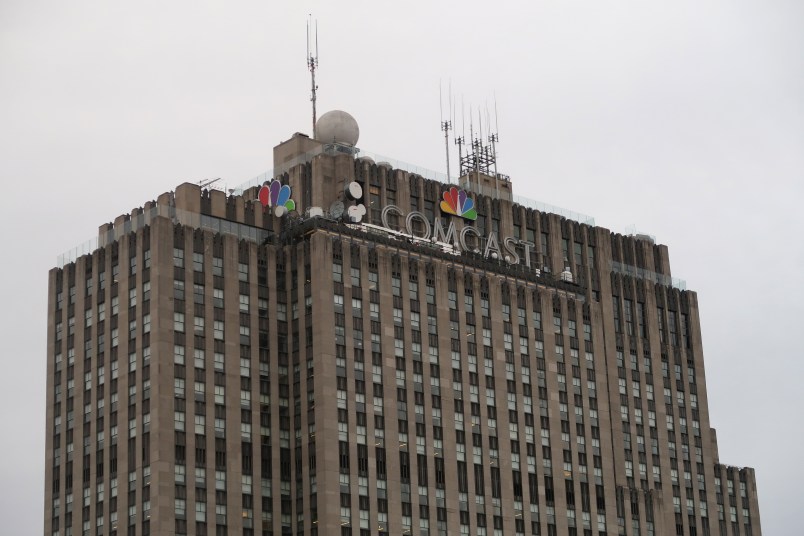NEW YORK (AP) — Comcast’s NBC is airing both the Super Bowl and the Olympics in February, a double-whammy sports extravaganza that the company expects to yield $1.4 billion in ad sales, helping it justify the hefty price it’s paying for both events.
NBC is banking heavily on these sports events since traditional TV ratings have slumped in recent years. Live sports are marquee TV events that draw most of the largest TV audiences, but even those ratings have declined. More Americans are dumping their cable packages — Comcast lost 33,000 video customers in the fourth quarter and 151,000 for all of 2017 — and advertisers are following consumers to their phones.
Spending on U.S. TV ads is expected to grow an anemic 0.4 percent this year, according to eMarketer.
In the October-December quarter, NBCUniversal’s broadcast TV ad revenue fell 6.5 percent, after a boost in 2016 from election ads. As it adapts to a slowing TV market, NBC is continuing some digital efforts from Rio and expanding others to meet viewers wherever they are — whether in front of a TV or not.
THE SUPER BOWL
The Super Bowl reaches more than 100 million people in the U.S., outstripping every other TV event. It’s the most expensive ad time on TV.
This year’s Super Bowl is Feb. 4 and follows a two-year slump in regular-season NFL ratings, according to ESPN . But NBC has said it is not worried about a lack of interest. The game is an event that “transcends sport and even the game itself,” Dan Lovinger, an NBC Sports ad-sales executive, said in January, about three weeks before the game.
NBC said then that it had nearly sold out Super Bowl ad spots and that on average, companies are paying more than $5 million for 30-second ads during the game. Kantar Media expects rates slightly higher than last year’s $5.05 million.
Fox aired the Super Bowl in 2017, and said it had $500 million in ad revenues for the day. NBC has predicted about $500 million for the game and associated events this year.
NBC also makes money from ads during events before and after the game and a special episode that day of its hit drama, “This is Us.”
For the first time, it’s selling ads for the game that will only appear on its app or website.
ADS FROM PYEONGCHANG
NBC is paying $963 million for the broadcast rights to the Winter Olympics in Pyeongchang, South Korea, which follow a Summer Olympics in Rio two years ago that disappointed in some ways.
NBC ruled the airwaves during the Rio Games, besting other networks, and raked in $250 million in profit. But ratings for the prime-time broadcast declined compared to the London Olympics in 2012, so NBC had to give advertisers some extra ad slots to make up for it.
This time around, NBC will sell ads for this Olympics based on total viewership, counting cable and digital viewers as well as those who tune into NBC proper. That gives them more leverage with advertisers, said Brian Wieser, an ad analyst for Pivotal Research Group.
NBC expects to sell more than $900 million worth of ads for the Olympics, which it says would be the highest ever for a Winter Games. (Summer Games are more popular.) The company is offering more hours of programming this year, both on TV and online, than it did for the Sochi Games in 2014.
KEEPING FANS HAPPY
Past Olympics have been criticized by fans for tape-delayed events. This year, NBC will air its nightly prime-time broadcast simultaneously across the country. That means the West Coast evening broadcast will start early, at 5 p.m.
The company says it will be able to show many Olympics events live for the U.S. audience, including skiing, snowboarding and figure skating. (U.S. prime time starts at 10 a.m. Korean time.) But some popular events will be live at odd hours in the U.S. Speed skating will take place in the evening in Korea, for example — but morning in the U.S.
NBC will stream the opening ceremony at 6 a.m. Eastern on Feb. 9, but only for cable customers. A delayed version will air on prime time. And it’s not yet clear whether exciting medal-round events will be shown at the best time for NBC’s ratings, said Kantar Media chief research officer Jon Swallen. NBC just says that all figure skating, alpine skiing and freestyle snowboard finals will be aired live in either prime time or what it calls “prime-time plus,” which stretches from 11:30 p.m. until 2 a.m. Eastern.
GOING DIGITAL
As it did during the Rio Olympics, NBC has again partnered with BuzzFeed to make videos on Snapchat, a messaging app popular with millennials. These will include behind-the-scenes videos posted by Snapchat users, clips of athletes and Olympics venues shot by BuzzFeed, and snippets of NBC’s own Olympics coverage. NBC’s revenue from its Snapchat deal is in the tens of millions, said an NBC Sports spokesman.
The broadcaster is also teaming up with the online news site Vox to make a daily Olympics podcast for the 18 days of competition. NBC parent Comcast is showcasing both NBC’s Olympics broadcasts and streaming video for its home cable customers in a way that will be easily searchable on TV sets.
In its fourth-quarter earnings report on Wednesday, Comcast said its net income soared to $15 billion, or $3.17 per share, from $2.3 billion, or 48 cents per share, because of a one-time impact from tax changes recently signed into law. Revenue climbed 4 percent to $21.92 billion.



